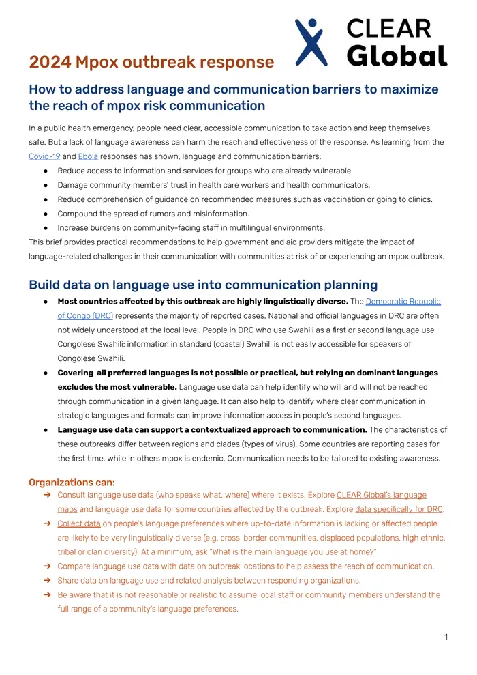
Breaking Down Language Barriers in the 2024 Mpox Outbreak Response: A Critical Approach for the Democratic Republic of the Congo
2024-10-01
Introduction
In the midst of a public health crisis, effective communication is paramount for ensuring community safety and action. However, the ongoing challenges presented by language and communication barriers can severely hinder these efforts, particularly in vulnerable populations. Lessons learned from past health emergencies such as the Covid-19 pandemic and the Ebola outbreak illuminate the various negative impacts these barriers can have, including:
Limited Access to Information
Many individuals in vulnerable groups may struggle to understand health communications, leading to decreased access to vital information and resources that could aid in their protection and well-being.
Erosion of Trust
Without clear messaging, community trust in healthcare workers and health communicators erodes. This mistrust can deter individuals from seeking medical help or adhering to public health guidelines.
Confusion over Guidelines
When health communications are not tailored to the linguistic needs of the community, individuals may misinterpret recommendations regarding vaccinations or healthcare services, potentially endangering their health and that of those around them.
Spread of Misinformation
In the absence of clear communication, rumors and misinformation can thrive, complicating public health efforts and potentially leading to panic or non-compliance among community members.
Increased Pressure on Healthcare Workers
Multilingual environments necessitate additional training and resources for community-facing staff to effectively manage the diverse linguistic needs of their clientele, which can strain already limited resources.
Recommendations
To enhance the effectiveness of the response to the mpox outbreak, this brief outlines practical recommendations for governments and aid providers. These strategies focus on improving communication efforts by prioritizing language inclusivity and understanding in all risk communication activities, thereby maximizing reach and impact.
Utilize Diverse Communication Channels
Employ various media platforms like radio, social media, and community bulletins that cater to different linguistic groups to disseminate information broadly.
Engage Community Leaders
Collaborate with local leaders and influencers who can help convey messages in culturally relevant ways, increasing credibility and trust.
Provide Translated Materials
Ensure that health resources such as pamphlets, brochures, and digital content are available in multiple languages pertinent to the community's needs.
Train Healthcare Workers
Equip healthcare providers with language training and resources to better communicate with patients from diverse backgrounds.
Monitor and Correct Misinformation
Establish a system for tracking misinformation and proactively addressing false claims to maintain community trust and encourage accurate understanding.
Conclusion
By implementing these strategies, stakeholders can help mitigate the adverse effects of language barriers, ensuring communities at risk can receive critical information and support during the 2024 mpox outbreak. The stakes have never been higher, and with thoughtful planning and execution, we can make strides toward a healthier and more informed population.



 Brasil (PT)
Brasil (PT)
 Canada (EN)
Canada (EN)
 Chile (ES)
Chile (ES)
 España (ES)
España (ES)
 France (FR)
France (FR)
 Hong Kong (EN)
Hong Kong (EN)
 Italia (IT)
Italia (IT)
 日本 (JA)
日本 (JA)
 Magyarország (HU)
Magyarország (HU)
 Norge (NO)
Norge (NO)
 Polska (PL)
Polska (PL)
 Schweiz (DE)
Schweiz (DE)
 Singapore (EN)
Singapore (EN)
 Sverige (SV)
Sverige (SV)
 Suomi (FI)
Suomi (FI)
 Türkiye (TR)
Türkiye (TR)